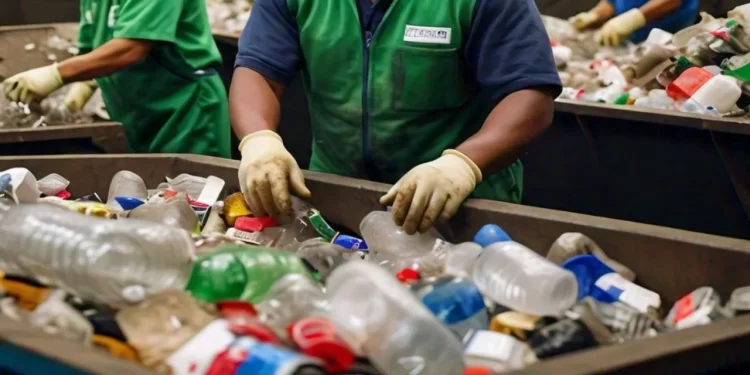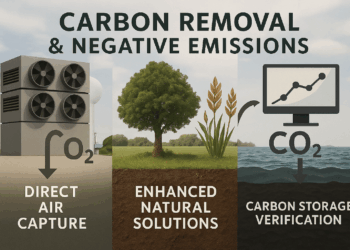The recycling industry represents one of the most promising sectors for economic growth and environmental sustainability worldwide. In the United States alone, the industry is valued at $200 billion annually, highlighting its substantial economic potential. This sector creates 7-10 times more jobs than landfills and waste-to-energy plants, making it a pivotal contributor to employment and local economies. By transforming waste into valuable resources, recycling not only supports U.S. manufacturing but also generates profitable export opportunities to countries like China and India. Companies such as Waste Pro USA exemplify how the recycling industry can achieve significant financial success while championing environmental sustainability.
Economic Opportunities and Job Creation
Recycling plays a vital role in driving economic growth. According to the Institute of Scrap Recycling Industries (ISRI), the U.S. recycling industry supports over 500,000 direct jobs and indirectly contributes to an additional 1.5 million jobs. These positions span diverse roles, from collection and sorting to advanced manufacturing processes. The higher labor intensity of recycling compared to traditional waste management is a key factor in its robust job creation. For instance, materials recovery facilities require skilled operators, logistics coordinators, and technology specialists, underscoring the industry’s demand for a skilled workforce.
The economic benefits of recycling extend to global markets. Exporting recycled materials provides significant revenue streams, particularly in countries with high demand for secondary raw materials like China and India. For example, China has historically been the largest importer of U.S. recycled paper and plastics, reflecting the global interdependence of supply chains. Despite regulatory shifts like China’s National Sword policy, which limited waste imports, the demand for high-quality recycled materials persists, urging businesses to adopt cleaner and more efficient recycling practices.
Environmental Sustainability: A Dual Benefit
Recycling not only drives economic growth but also plays a critical role in addressing environmental challenges. By diverting waste from landfills, recycling reduces greenhouse gas emissions and conserves natural resources. According to the Environmental Protection Agency (EPA), recycling a single ton of paper saves approximately 17 trees, 7,000 gallons of water, and 463 gallons of oil. Similarly, recycling aluminum cans saves 95% of the energy required to produce new cans from raw materials.
These environmental benefits align with global sustainability goals, making the recycling industry a key player in combating climate change and promoting a circular economy. Recycling businesses that prioritize environmental stewardship often find themselves better positioned to meet regulatory requirements and consumer demand for sustainable practices.
Waste Pro USA: A Success Story

Waste Pro USA exemplifies how recycling can thrive as a profitable and sustainable business model. Headquartered in Longwood, Florida, the company has established itself as a leader in the U.S. recycling industry. Specializing in materials such as paper, cardboard, aluminum, plastic containers, newspapers, and steel, Waste Pro USA has developed a comprehensive recycling infrastructure that serves both residential and commercial clients.
In 2023, Waste Pro USA reported an impressive annual revenue of $1.05 billion, underscoring its financial success. The company’s growth can be attributed to its commitment to innovation and efficiency in recycling operations. By investing in advanced sorting technologies and expanding its service reach, Waste Pro USA has managed to stay competitive in a dynamic market.
Moreover, Waste Pro USA actively promotes environmental education and community engagement. Through initiatives that encourage proper recycling practices, the company helps reduce contamination rates, thereby increasing the value of recycled materials. Such efforts not only enhance operational efficiency but also foster a culture of environmental responsibility among consumers.
Global Prospects and Challenges
While the recycling industry offers immense potential, it also faces challenges that require strategic solutions. Fluctuating commodity prices, contamination of recyclable materials, and evolving regulations are some of the hurdles businesses must navigate. However, these challenges present opportunities for innovation. For instance, advancements in artificial intelligence and robotics are revolutionizing waste sorting processes, enabling businesses to improve material recovery rates and reduce costs.
The global push for sustainability further bolsters the industry’s prospects. Governments and corporations worldwide are adopting ambitious recycling targets and zero-waste policies. In the European Union, for example, the Circular Economy Action Plan aims to achieve a 65% recycling rate for municipal waste by 2035. Such initiatives create a conducive environment for recycling businesses to expand and innovate.
Conclusion
The recycling industry is a lucrative and impactful sector that combines economic profitability with environmental sustainability. In the U.S., companies like Waste Pro USA demonstrate how effective business models can thrive in this space, generating significant revenue while promoting eco-friendly practices. On a global scale, the demand for recycled materials and the push for a circular economy reinforce the industry’s long-term viability. By investing in recycling, businesses not only capitalize on financial opportunities but also contribute to a sustainable future for generations to come. This dual benefit makes the recycling industry an indispensable component of modern economies and a compelling choice for entrepreneurs and policymakers alike.








